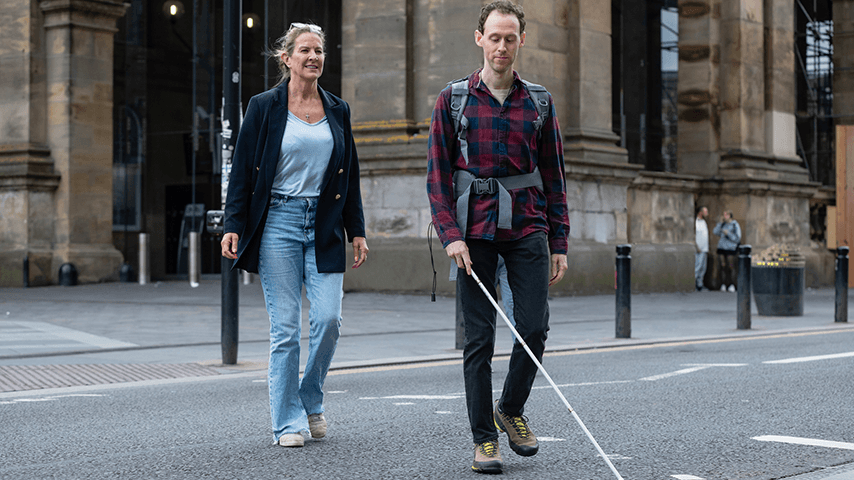
Related Topics
We use our eyes to complete daily tasks like preparing meals, engaging in physical activity, taking the correct medication and dosage, protect ourselves from falling, and so much more. That's why it's important to keep them healthy, so we're seeing our best and maintaining our independence. If we don't, the quality of our vision could decline—from a combination of age and lifestyle factors. These simple guidelines can help you maintain your vision health.
Eat well for healthy vision
Consuming a well-balanced diet rich in nutrients can help your vision. Studies have found that omega-3 fatty acids play a role in reducing age-related eye diseases and dry eyes, which are common as we age.
Here is a list of foods that are rich in omega-3 fatty acids that you can introduce into your diet:
Leafy Greens
- Spinach
- Kale
- Brussels Sprouts
Fish
- Salmon
- Sardines
- Cod
Nuts and seeds, like walnuts, chia seeds, and flaxseed, are good choices for omega-3 fatty acids as well.
Wear sunglasses to protect your eyes
The sun radiates ultraviolet (UV) rays, which are wavelengths that can’t be seen with the human eye. While UV rays are known to cause sunburn, long exposure to UV rays can also be harmful to your eyes, causing short and long-term damage.
An example of short-term damage is not being able to see after spending time on the slopes or shoveling snow. This is called snow blindness, which is caused by UV rays reflecting off the ice and snow. You won’t notice you are experiencing snow blindness until you go inside, and it usually goes away in a few hours. Long-term damage occurs from years of prolonged sun exposure, and results in cataracts and macular degeneration.
To protect your eyes from the sun when you are outdoors, wear protective sunglasses with UV protection and a brimmed hat.
Manage your health conditions to minimize risk
According to a recent study from the Centers for Disease Control and Prevention (CDC), poorer health is a known association of chronic conditions and older people with vision impairment.
Because of the aging US population, the public health burden of vision impairment and chronic diseases is expected to increase.
Certain health conditions can affect your eye health, including diabetes, high blood pressure, and heart disease. Minimize your risk of developing eye diseases by managing your chronic condition(s) to perform daily tasks and engage in social activities.
Limit your screen time to lessen vision discomfort
Using our smartphones, tablets, and computers to watch/stream shows, play games, and connect with family and friends has become part of every day life. However, looking at a screen for an extensive amount of time can cause eye strain, blurry vision, and dry eyes.
Remember to take breaks when using your devices. You can give the 20-20-20 rule a shot: Every 20 minutes, look away about 20 feet in front of you for 20 seconds. Doing this quick exercise could reduce strain. If you start to experience any vision discomfort, make sure to talk to your eye doctor.
Schedule an annual eye exam
The best way to know if your eyes are healthy is to see an eye doctor each year. According to the CDC, many common eye diseases, such as glaucoma, diabetic eye disease, and age-related macular degeneration, show no warning signs but can be detected by your eye doctor before they worsen. An optometrist or ophthalmologist can perform routine eye exams to check your vision and the health of your eyes.
Your eye doctor might recommend that you get a dilated eye exam, which is the only way to detect these diseases in their early stages. During your dilated eye exam, drops are placed into your eyes for your pupils to widen, allowing more light to enter. After 30 minutes, your eye doctor can see the inside of your eyes and check the health of the retina, optic nerve, and other parts that cannot be seen otherwise. This process will allow the eye doctor a better look into the health of your eyes.


